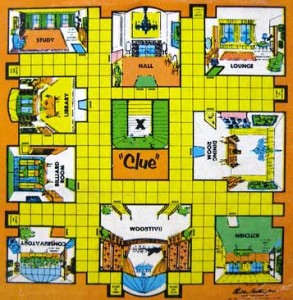 When I was a kid (and not damming up Yellow Creek), my brother and I played two board games, Monopoly and Clue. My brother liked (and usually won) Monopoly which probably paid off in his role as a VC. Clue was my favorite. I liked it because I was good at making educated guesses. Nothing better than correctly guessing Colonel Mustard did it with the rope in the library. (Or was it the pipe?)
When I was a kid (and not damming up Yellow Creek), my brother and I played two board games, Monopoly and Clue. My brother liked (and usually won) Monopoly which probably paid off in his role as a VC. Clue was my favorite. I liked it because I was good at making educated guesses. Nothing better than correctly guessing Colonel Mustard did it with the rope in the library. (Or was it the pipe?)
Today, I still look for clues – clues about people. Whether I’m reading the morning paper, watching TV or crunching popcorn at the movies, I notice anything that can help me understand what makes people tick. This clue-seeking propensity helps me make better educated guesses, not about who murdered whom, but about what might have killed someone’s confidence or dream and the conversations we to have so they can reclaim what’s been crushed.
This summer, while reading Sue Grafton’s alphabetical mystery offerings featuring Kinsey Millhone, a female private investigator, I noticed a few clues that captured several key concepts that I use as a coach. When practiced, these actions help us tick effectively with ourselves and others, building confidences, solving complex issues and reigniting possibilities.
|
Watch other people for clues about who they are, not just clues about how much they are or are not like you. Patti Digh |
Clues & Concepts
- Clue from Grafton’s A is for Alibi: “You try to keep life simple but it never works, and in the end all you have left is yourself.” Concept: Understand what you do and don’t do well so you can rely on yourself. Control what you can, let go what you can’t. Understand what you need to be your best.
- Clue from Grafton’s B is for Burglar: “(When the locksmith entered my apartment) … I snatched up several articles of dirty clothing strewn around about my living room. There’s nothing like an outsider’s idle glance to make you conscious of your own environment.” Concept: Shifting your point of view and seeing what another sees shifts your thinking and gives you more options for action.
- Clue from Grafton’s C is for Corpse: He said to (Kinsey): “Now listen. Swear to me you won’t do anything stupid.” I said to him: “How can I do anything stupid? I don’t even know what’s going on. Besides, ‘stupid’ is after the fact. I always feel smart when I think things up.” Concept: No one says “I know I am about to make a mistake.” Mistakes only happen after the fact when we label it as such. If you “beat yourself up” for making mistakes, give it up. If you “get yourself up” and learn from your mistakes, keep it up.
| There seemed to be endless obstacles preventing me from living with my eyes open, but as I gradually followed up clue after clue, it seemed that the root cause of them all was fear. Joanna Field |
A-B-C is for Always Be Curious
Gathering clues about what makes you tick will also help you understand what makes others tick. That makes it possible for everyone to win whether you’re playing a board game or in the board room. Stay curious, my friend, the clues are out there. Besides, being clueless doesn’t cut it anymore.
Subscribe
Get Camille's latest posts!
